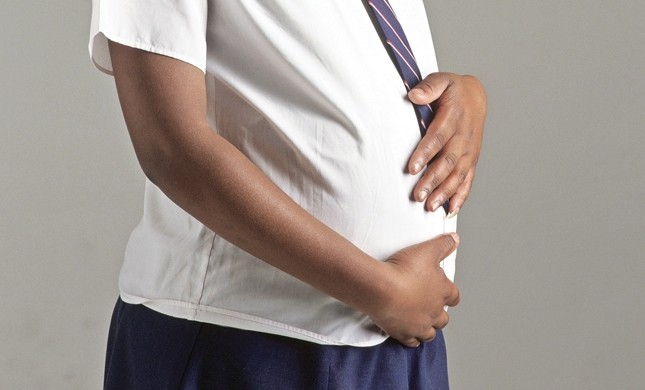Teenagers who endure pregnancy without any support, especially from their school, are likely to have babies who grow up in poverty and eventually become young parents themselves.
“Research shows the children of teenage parents, regardless of the sex, tend to repeat the cycle. It then continues with many problems along the way, like broken families, domestic violence and so much more,” said Prof Dr Sompong Jitradub, a member of the Equitable Education Fund and former lecturer at Chulalongkorn University’s Faculty of Education.
Hence, the joint move by the ministries of Education and Higher Education to prohibit schools and colleges from expelling pregnant students is a step forward, he said.
Bright future despite early pregnancy
Under the new regulation, which went into effect on February 18, educational institutes cannot bar pregnant students from attending class. They can be transferred to another institute, but only of their own volition.
“This regulation is good to an extent,” Sompong said.
Though the Education Ministry imposed measures to protect the rights of pregnant students in 2018, many schools were caught pressuring teen mothers to “voluntarily” leave.
Believing that pregnant students brought shame to their institute, school executives used the proviso that allows them to transfer students as a loophole to get rid of young mothers-to-be. The two ministries eventually realized the proviso was being abused and introduced the new regulation as a remedy.
Teenage mothers who drop out of school have little chance of continuing their education, so end up losing out on opportunities in later life. Without proper schooling, they risk spending their entire lives as unskilled, low-paid workers.
Sompong cited a typical case in which a young teen got pregnant while she was in Mathayom 2. She left school to give birth to a daughter, and later took up a factory job to support herself and her child.
Her factory shifts became longer as she had two mouths to feed. She even developed varicose veins at a young age because she had to stand for many hours at work.
Her daughter, meanwhile, grew up in deprivation, with her mother absent most of the time. After spending her childhood surrounded by drugs and violence, she too became a teen mother and ended up working long hours at a factory.
“She could have had a different life if the educational system had been more supportive back then,” Sompong said.
Why understanding matters
In 2018, Aey became pregnant while she was in Mathayom 4. The Education Ministry had already imposed a regulation barring the expulsion of pregnant students – but not their transfers.
“I was lucky that my parents, teachers, and friends were very understanding. Thanks to their support, I was able to continue my studies at the same school and complete my senior secondary schooling, or Mathayom 6,” Aey said.
An orientation teacher at Aey’s school in the North said she has watched teenage pregnancies spawn more problems in the long run when young mothers fail to get support.
“My school began embracing pregnant students even before the Education Ministry imposed a ban on their expulsion in 2018,” she said.
Her school not only allows pregnant students to stay in class, but also offers them the flexibility to ensure they can keep up with their studies before and after giving birth.
“For instance, we let them take exams at times that are convenient for them. If they are too shy to attend class, they can follow up via other means and submit homework,” the teacher said.
She added that her school also allows pregnant students to switch programs if their academic performance drops and if another program suits their schedule better. They can also take maternity leave and return to school later.
“If they decide to attend class, we just request that they wear a blazer. Two of our students went into labor during class and we took them to the hospital ourselves,” she recounted.
Could the new rule encourage teen pregnancies?
The teacher rejected the idea that letting pregnant teenagers stay in school would encourage more youngsters to have sex and become parents early.
“On the contrary, the ordeal their pregnant friends go through will teach them to stay safe and avoid risky sex,” she said.
Kamonthip Songdam, director of Ban Koh Kwan School in Nakhon Si Thammarat province, said some teachers were initially appalled at the idea of embracing pregnant teens out of concern that they would become bad examples. However, she said, she managed to persuade them that pregnant students have already suffered a lot and need all the support they can get.
“It’s important that we reach out to these children quickly,” she said. “We should also get their parents to stand by them and give them confidence that they really can get through this difficult time.”
A Mathayom 3 student at Kamonthip’s school became pregnant while classes were suspended during the pandemic. Learning of the pregnancy, caring teachers followed up by ensuring the girl continued her online classes and completed assignments.
“We also encouraged her friends to stand by her,” Kamonthip said.
Pregnant schoolgirls often drop out easily because teenagers tend to underestimate the importance of education, she explained.
“But as they get older, they end up regretting this decision. If they continue their studies a little longer, they can get the certification required to get jobs in many places,” the school director said.
Kamonthip added that she is relieved the pregnant teen at her school had at least completed Mathayom 3.
Sompong, meanwhile, called for more action to address the problem of teenage pregnancies. For instance, family centers should be built to educate young couples about how they can build a warm and loving family. The fathers should also be taught about their responsibilities. With such initiatives in place, children born to teenage mothers would have better opportunities and the chance of a good quality of life.
“We should also consider offering job opportunities to these teenagers,” he said.
Young moms in Thailand
Teens aged between 15 and 19 gave birth to 128,492 babies in 2012.
The same year saw 3,700 babies born to girls aged between 10 and 14.
In 2020, the figures had dropped to 56,000 for the 15-19 age group and 1,783 for those aged 10-14.
However, the birth rate in the overall Thai population has also dropped to about 600,000 from more than 1 million eight years ago. – ThaiPBS




































